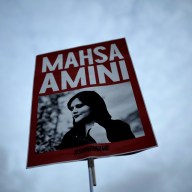 One of the pieces of dreamy animation in “An Oversimplification of Her Beauty.”
One of the pieces of dreamy animation in “An Oversimplification of Her Beauty.”
Credit: Stephanie Matthews
‘An Oversimplification of Her Beauty’
Director Terence Nance
Stars: Terence Nance, Namik Minter
Rating: NR
4 (out of 5) Globes
“Write what you know” goes the adage preached at many film schools. For their first features, many filmmakers choose deeply, sometimes uninteresting, personal stories. It’s safe to say no one has been both as naval-gazing and as unique about it as Terence Nance. Starting with its mouthful of a title, “An Oversimplification of Her Beauty” is relentlessly original, abandoning narrative altogether to adopt an essayistic form that has few close comparisons, if any.
The kicking-off point is the height of TMI banality: a girl cancelled a date. Fresh off a conquest, a man embodied by Nance broods when the lady in question calls off a subsequent meet-up. We never hear the man’s voice, guided only by an anonymous, authoritarian narrator who puts everything in the second person — as though Nance could relate to us only by insisting upon it. He uses this relative non-event as an excuse to spiral from one thought to the next, delving into past relationships, his race, his paranoia about “The Cosby Effect” — about being a black man in America in an age with comparatively few real problems — and anything else tangentially related to the subject.
This topic has been in his head for longer than this one film. The roots of “Oversimplification” go back to his 2010 short “How Would You Feel?,” which is spliced in here towards the beginning, before Nance goes even farther afield. What starts off as experimental live action, with Nance entering into a dialogue with his slightly younger self — all while obscuring his actual voice — soon makes way for dreamy animation.
It’s easy to overstate “Oversimplification”’s originality, as though being sui generis is enough. But its shape-shifting and deconstructive nature begs for the viewer to do some deconstructing of their own. Is Nance’s film as deep as it thinks it is, or is it distracting us with its relentless creativity? It’s a mix of the two, but it’s still massively impressive, and beautiful even before it turns cartoon. In the future Nance could stand another topic than himself. He has the chops for it. He’s both creative and rigorous, both right brain and left brain. He’s clearly at home either hiding away in a studio, working hard on a canvas, or locking himself inside an archive, doing heavy research. He’s that rare type: both artistic and wonky.
















